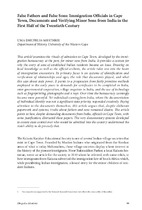False fathers and false sons: Immigration officials in Cape Town, documents and verifying minor sons from India in the first half of the twentieth century
Abstract
This article examines the rituals of admission to Cape Town, developed by the immigration bureaucracy at the port, for minor sons from India. It provides a context for why the entry of sons of established Indian residents became an issue. Drawing on local knowledge as well as the official archives, the article takes one into the heart of immigration encounters. Its primary focus is on systems of identification and verification of relationships and ages, the role that documents played, and what this says about state power. It points to a progression from fairly primitive methods employed in the early years to demands for certificates to be completed in India, inter-governmental cooperation, village enquiries in India, and the use of technology such as fingerprinting, photographs and x-rays. Over time the bureaucracy seemingly became more powerful. Yet individuals coming from India, where the documentation of individual identity was not a significant state priority, responded creatively. Paying attention to the documents themselves, this article argues that, despite elaborate paperwork and systems, truths about fathers and sons remained elusive. The article points to how, despite demanding documents from India, officials in Cape Town, with some justification, distrusted these papers. The very documentary systems developed to ensure state control over who would be admitted into the country undermined the state's ability to do precisely that.

